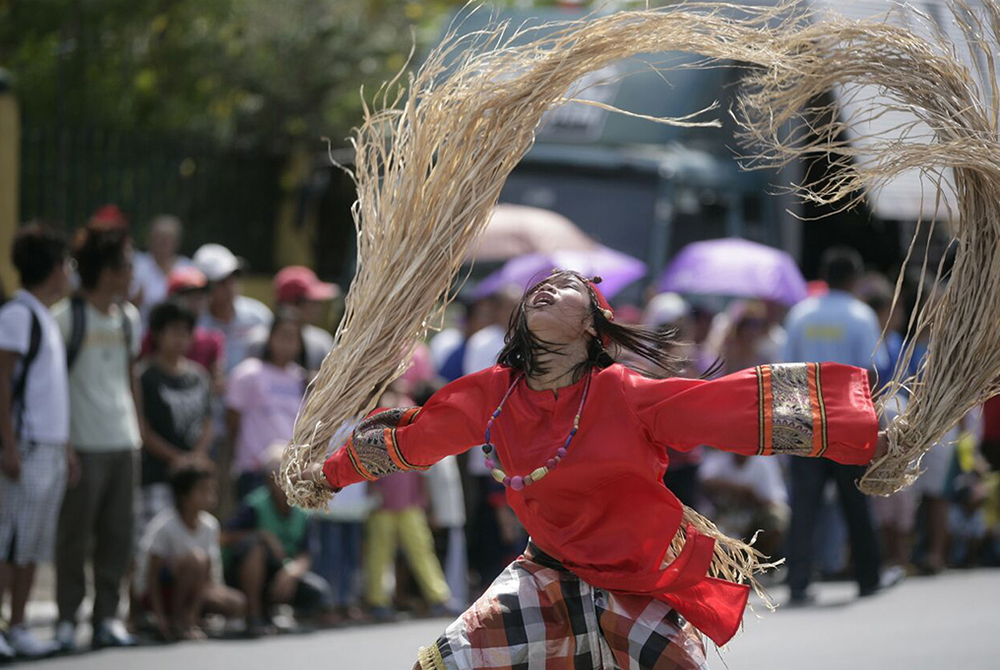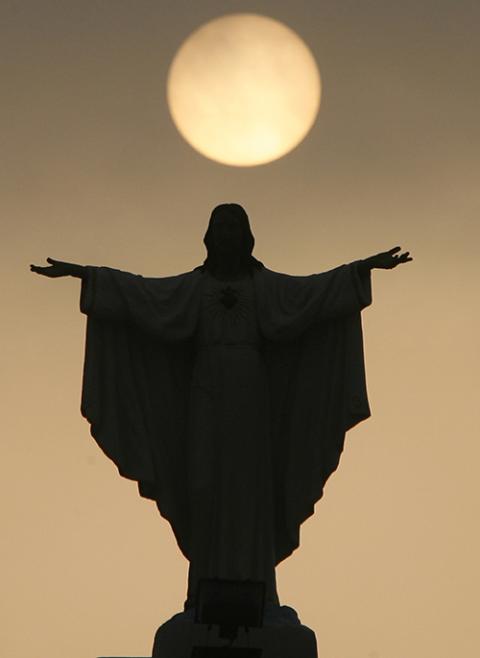
A performer representing a babaylan shaman is pictured at a traditional festival in Bago, in Negros Occidental, Philippines. As Donny Mioskowski Cámara writes about precolonial Philippines, "Masculine and feminine energies coexisted in the babaylan — women and men — and these leaders were honored for their connection to the divine." (Wikimedia Commons/Hptina24, CC BY-SA 4.0)
Indian Catholic feminist theologian Kochurani Abraham once shared with me an Indian saying she learned as a child: If you want to pick a mango from the tree above your head, you have to let go of what you are holding under your arm in your armpit.
Abraham applied the saying to the church's reception of the encyclical "Laudato Si', on Care for Our Common Home," noting that if the church wants to reach up for a relationship of mutuality with the earth, it has to let go of the relationships of domination and coercion that it is holding under its armpit.
But this can also be applied to the notion of synodality. As a gay Filipino American Catholic, I believe that the church will never become a synodal church unless church leaders let go of three unspoken assumptions that prevent the church from faithfully transmitting the liberating and life-giving message of God to us through the teachings and life of Jesus. These assumptions are power as domination, the superiority of elite Western European culture and the norms of heteropatriarchy.
The first assumption has to do with how power is exercised in the church. In his book Church: Charism and Power, liberation theologian Leonardo Boff contrasts the distortion of power as domination, as practiced by the clerical-hierarchical system, with how power for Jesus was always the power of love, which is service. Boff says (my translation from the Spanish):
Goodness, renunciation of judging others, indiscriminate love, forgiveness without limits, are the great ideals proposed by Jesus, which does not introduce or sacralize privileges that can give rise to the existence of castes and divisions among men. Exousia, that is, the sovereignty that is manifested in his words and actions, is not power in the style of human power, but is the power of love. … And the power of love has a different nature from that of power-domination: it is fragile and vulnerable, captivated by its weakness and by its capacity for surrender and forgiveness. This exousia is what Jesus manifested in his life. That is why he renounced power-domination; That is why he preferred to die weak, rather than use it to subdue men and make them accept his message.
Shadows of history continue to haunt the Catholic mindset in many places. When the Catholic Spanish conquered my Filipino ancestors, they used tremendous violence to impose a society structured by domination at all levels, the superiority of elite Western European cultures and the norms of heteropatriarchy.
Before the arrival of the Spanish, the islands that today make up the Philippines had myriad indigenous cultures with various social structures and religious beliefs and practices. Even today, after 330 years of Spanish domination and 50 years of American colonization, the Philippines has many regional cultures with their own languages and customs. For example, people would often ask me if my family spoke Tagalog, the indigenous language of the Manila region, because we are Filipino. But we are Bicolanos, from the Bicol region, and we have our own language.
One of the many fascinating aspects of pre-Hispanic Filipino culture is that the non-Muslim peoples had very different ideas about gender, gender roles and sexual practices than the Catholic Spanish. (Islam had already arrived in the Philippines before the Spanish). To impose their colonial rule and the Catholicism that justified their takeover of the islands, the Spanish had to impose a system of gender and norms of sexual practices that is known as heteropatriarchy. The imposition of these norms and of Catholic belief was a centurieslong and violent process whose effects are profoundly embedded in contemporary Filipino culture.
Advertisement
In pre-Hispanic Philippines, the spiritual leaders in non-Muslim communities were women or men who dressed in women's clothes. These leaders had various names in the different cultures. One of these names is "babaylan," which has been used among present day Filipinos to reclaim our indigenous spiritual practices. Masculine and feminine energies coexisted in the babaylan — women and men — and these leaders were honored for their connection to the divine.
Heteronormative sexual practices did not exist in precolonial Philippines. People had sexual-emotional relationships with people of all genders, and different-sex relationships were not seen as superior to same-sex relationships. There was no concept of "straight" and "gay" or "cis" and "trans" people.
The Spanish were vicious in their imposition of European Catholic gender and sexual norms and in the forcible conversion of Filipinos to their religion. The babaylans were stripped of their leadership, and often times murdered. Non-heteronormative sexual practices were severely punished and went underground.
As a gay Filipino American, I have inherited this tragic past and I have experienced this dehumanizing violence in my family, in my Catholic upbringing and from Catholic leadership at all levels beyond the parish. Since I was a child, I have been subjected to the use of power as domination and the imposition of Western European cultural norms and heteropatriarchal models of relationships. This violence was done to me during my 13 years of Catholic school education and through attendance at Mass and through the statements and official documents that the church continues to issue.
Boff offers us a hopeful vision of what the church can be:
Consideration of the behaviors of the holy humanity of Jesus Christ must remain a critical norm for the Church, built upon that humanity. The concrete and coherent experience of this sense of service of authority would certainly make the Church the space of freedom, fraternity and free communication among all: between those responsible for the unity of the community and its other members. The Church would be a symbol of authentic liberation and freedom, and not of the homogeneous adherence of all to a closed and centralist system that tends to disqualify those who depart from it, with terms that are sometimes only applied to the morally depraved and criminals [my translation from the Spanish].
If the church has to become a "symbol of authentic liberation and freedom," what should be the norms for theology, liturgy, church structures, family structures and our sexual-emotional lives? This needs to be addressed in the synodal process if the church is to be faithful to Jesus' example of power as service.

A statue of Christ is seen in silhouette during sunrise at Resurrection of Our Lord Church in Paranaque, outside Manila, Philippines, Feb. 23, 2010. (CNS/Reuters/Erik de Castro)
The answer is so obvious: "Love one another as I have loved you." If only love is the norm, what will an inculturated theology look like? What will liturgy, prayer as community, look like when it develops organically from experiences and insights of a particular culture without seeking to impose Western European practices and customs from the past? What will church structures and ministries look like if they take on loving ways of service from each culture, as the babaylans did for my Filipino ancestors? How will the church recognize and celebrate the diverse ways that human beings make commitments to one another in love and share their bodies and spirits intimately and lovingly in sex?
If the church inculturates itself in many diverse ways, then there will no longer be only one way to talk about the Divine, only one way to pray together in community, only one way to structure families and only one way to live a sexual life. Yet the true unity in all this diversity will be love — where communities give a warm welcome to a stranger, where people live a life full of care for themselves and concern for others and for God's creation. Love is universal. We know what it is when we experience ourselves being honored for who we are, not forced to take on the expectations of others, when we experience being cared for in our suffering and sorrows and accompanied in our celebration of the good gifts that life brings us.
During my first visit to the Philippines in 2011, I traveled to my family hometown, Gubat, in Sorsogon province in the Bicol region at the southernmost tip of the island of Luzon. I went to pray in St. Anthony Church, where my mother was baptized and where my Filipino ancestors have been baptized since the 18th century. The pastor at that time was Msgr. Francisco P. Monje. He was known by everyone in the parish as "Monse" — not Monsignor — and he would travel around the province on a small motorbike, ministering to the people in the poorest "barangays" or neighborhoods.
Monse warmly welcomed me to Gubat and we had many conversations about the church and its place in the world. I will never forget his image of what the church could be. Monse said that his dream was that when people asked for the church of St. Anthony, the response would be that today the church was in this barangay celebrating Mass and helping the community with a project, and tomorrow in another barangay also celebrating Mass and serving the community. The parish was not the building, nor the pastor, but rather the whole community out on mission, living a ministry of service. When will the whole Catholic Church live out Monse's dream?




